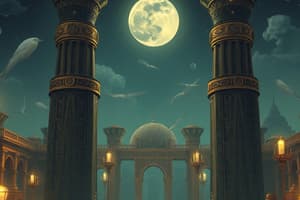Podcast
Questions and Answers
What significant architectural structure is associated with Djoser's reign in Dynasty 3?
What significant architectural structure is associated with Djoser's reign in Dynasty 3?
- Bent Pyramid
- Step Pyramid (correct)
- Red Pyramid
- Great Pyramid of Giza
What was the purpose of the offering scenes depicted inside the chapels of mastabas?
What was the purpose of the offering scenes depicted inside the chapels of mastabas?
- To display wealth and power
- To provide for the deceased in the afterlife (correct)
- To honor the gods of the underworld
- To celebrate the life of the king
What transformation did Snefru make to the design of pyramids during Dynasty 4?
What transformation did Snefru make to the design of pyramids during Dynasty 4?
- From decorative exteriors to plain designs
- From small tombs to massive structures
- From stepped pyramids to smooth-sided pyramids (correct)
- From rectangular shapes to triangular shapes
What was a common characteristic of high officials' tombs in the Old Kingdom?
What was a common characteristic of high officials' tombs in the Old Kingdom?
What role did the alignment of Djoser's funerary complex play in the Old Kingdom?
What role did the alignment of Djoser's funerary complex play in the Old Kingdom?
What was the main source of knowledge regarding Old Kingdom material culture?
What was the main source of knowledge regarding Old Kingdom material culture?
During which period did pyramid building reach its peak in Egyptian history?
During which period did pyramid building reach its peak in Egyptian history?
What unique structure is characteristic of Djoser’s funerary complex aside from the Step Pyramid?
What unique structure is characteristic of Djoser’s funerary complex aside from the Step Pyramid?
Which king is primarily associated with the construction of the Great Pyramid at Giza?
Which king is primarily associated with the construction of the Great Pyramid at Giza?
What was the primary function of the valley temple in the pyramid complex?
What was the primary function of the valley temple in the pyramid complex?
What characterized the artistic style of royal statues during the reigns of Khafre and Menkaure?
What characterized the artistic style of royal statues during the reigns of Khafre and Menkaure?
What symbolic relationship did the pyramid represent concerning the sun god?
What symbolic relationship did the pyramid represent concerning the sun god?
What notable change occurred in the beliefs of kingship during Dynasty 5?
What notable change occurred in the beliefs of kingship during Dynasty 5?
What was a primary feature of the funerary complex layout during Khufu's reign?
What was a primary feature of the funerary complex layout during Khufu's reign?
What was the purpose of the sun temples built during early Dynasty 5?
What was the purpose of the sun temples built during early Dynasty 5?
Which element of the pyramid complex is directly adjacent to the pyramid itself?
Which element of the pyramid complex is directly adjacent to the pyramid itself?
Flashcards are hidden until you start studying
Study Notes
The Old Kingdom Overview
- The Old Kingdom period (ca. 2649–2130 B.C.) marked significant developments in Egyptian history, influencing future pharaonic practices.
- Key artistic, historical, and religious trends defined this era, with notable shifts from the beginning to the end of the period.
- Much of the understanding of material culture from this time relies on funerary evidence rather than settlement sites.
Dynasty 3: Djoser and the Step Pyramid
- Dynasty 3 began around 2649 B.C. with King Netjerikhet, later named Djoser.
- Djoser’s funerary complex at Saqqara featured Egypt's first pyramid, the Step Pyramid, which was the earliest stone structure in Egypt.
- The complex included cult buildings and underground chambers, designed to align the king with circumpolar stars and gods.
- High officials constructed mud-brick mastabas (rectangular superstructures) above tombs, often featuring enlarged offering niches turned chapels.
- Offering scenes in chapels depicted tomb owners before tables laden with food, ensuring magical provision in the afterlife.
Dynasty 4: Pyramid Building Height
- Pyramid construction peaked in early Dynasty 4, with King Snefru (ca. 2575–2551 B.C.) transforming the stepped pyramid into smooth-sided structures.
- The Great Pyramid at Giza, built by Khufu (ca. 2551–2528 B.C.), is the largest Egyptian pyramid.
- Pyramid complexes became standardized, typically including the pyramid, pyramid temple, valley temple, and a causeway.
- Artistic representation flourished, with prominent royal statuary during the reigns of Khafre (ca. 2520–2494 B.C.) and Menkaure (ca. 2490–2472 B.C.).
- The pyramids served as symbols of the sun god, linking kingship to solar worship, with the king portrayed as the sun god's son.
Dynasty 5: Rise of Solar Cults
- Early Dynasty 5 saw the growing importance of the solar cult, with six kings constructing sun temples in Abusir.
- These temples complemented the pyramid complexes and were primarily dedicated to the worship of the sun god.
- The relationship between the king and the sun god underscored the king's divine status in a highly stratified society, with administration closely linked to the royal family.
Studying That Suits You
Use AI to generate personalized quizzes and flashcards to suit your learning preferences.




